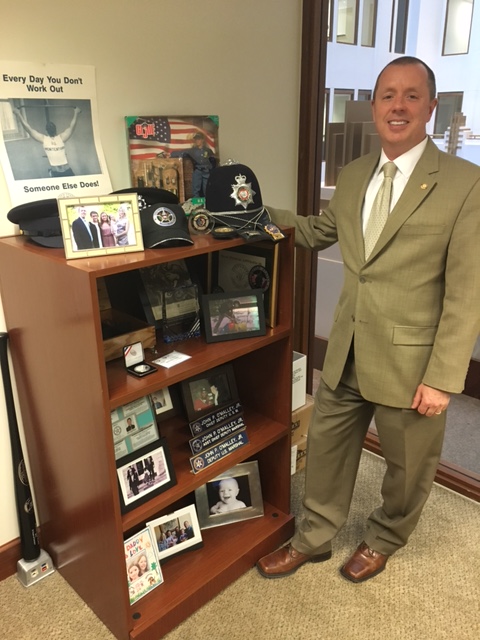Jumping in the Deep End Based on Timing, Personal Grit and Gut Instinct ...
“When I first started thinking about my transition, someone told me that my resume was really scary. Me, scary? It’s what we [U.S. Marshals Service] do. It’s supposed to be impressive. I thought I had sanitized it. To have to come to a place in your career after serving 25 years as a federal agent and no one knows what you’ve done except for whatever is described on paper, is a little bit difficult. But I knew how to prepare myself.”
Today, he chuckles under his breath, “It reminds me of advice I later gave to another retiring federal agent, “Avoid the GGD syndrome - Guns, Gangs and Drugs. Instead of highlighting your work in the gang world or handling violent crimes, scale it. What is it that you organized? How does what you did relate to what you will do in your next field?” O’Malley’s impressive accolades range from overseeing the operations of a seven state region,100 employees, and participating in over 1,000 complex fugitive investigations through collaborations with other federal, state and local law enforcement agencies; including the investigations of many U.S. Marshals Service Top 15 fugitive investigations. Back then, O’Malley realized that not only would he have to “sanitize his resume,” but he would also need to apply the same type of tactic previously used on the street: a strategic exit plan. He embarked on a detailed 18-month assessment to answer his own wonderings. "What skill sets do I possess and what do I need to do be transferable in the private sector?" Make corporate America realize the skills you developed in law enforcement are transferable to the private sector and don’t minimize all that you did. They don’t always understand the scope and breadth of what you did and accomplished.”
Regardless of whatever phase of life you find yourself—changing industries or searching for your next career after retirement, O’Malley’s advice is to “Jump into the deep end of the pool — and go for it. But don’t wait!” Start at a minimum of 9 months in advance:
Timing is Everything “A lot of people wait 90 days from leaving the military or federal law enforcement to begin their job search. I suppose the same is true for the majority of people everywhere else.” O’Malley recommends to start with an extended timeframe in mind to begin doing your research: looking at what you think you can accomplish, reviewing job descriptions and openings to determine if the desired skill set matches your own. Begin by calling upon colleagues who may already be in the place you want to go next. Get their feedback. Learn about what steps they took. He urges job seekers not to sell themselves short, “Look into what’s available way before you are going to make the leap. Find out what others did to prepare themselves to make a career transition. What is the actual layout of where you want to work next, what is the expectation of the people you will work with and work for?”
I looked at it as a win-win because I kept those relationships after they had transferred out of law enforcement posts into the private sector. It was very valuable, because a vast 
It Comes Down to Personal Grit
If you don’t have a high volume of contacts to begin with, identify the line of work that you want to get into and leverage organizations to network, such as professional associations and working groups. O’Malley advises, “Try to find organizations that are involved in the business that you are trying to get into— network to discover if it is really what you want.” Once you start to find positions, he encourages individuals to avoid placing themselves in a risky job security situation. “Find the right mix so you don’t go below your skill set but you don’t reach so far above it either that you don’t know how to perform the position you’re being asked to fill. You should reach for a position that is somewhat leveled from what you are doing now or have done previously. But be careful and know exactly what you are stepping into.” In the wise words of Abraham Lincoln, “The best way to predict the future is to create it.” And the only way we can create what we want is to learn it. In his quest to understand the needs of the corporate security, O’Malley did not despair in learning from others. “You never know where good advice or a good recommendation is going to come from. Always be willing to learn from people. Hear what people’s experiences have been, take those best practices, and implement the bits and pieces of information that will help you with what you are trying to accomplish.” Follow Your Gut & Always Have A Process We always hear follow your gut but there’s a bit more to it. O’Malley’s view on decision-making is to consider a few more factors beyond sheer instinct. In law enforcement, decision making often comes down to split-second decisions that comes from training and experience in being in situations. However, it’s not always like that in real life. “There are few times that I had to make a call on something right away. There seems to be more time to develop things before making a decision or making a recommendation in real life or in the corporate world. Do you have time to analyze it further and do you have time to receive input from others? If so, then make the best decision you can based on listening to your inside voice, and taking into consideration other sources of information to decide what you want to do. And then live with it, knowing you made your decision based on a process you have developed."
John O’Malley talks about Fox Lake investigation on WGN Morning News on September 9, 2015.
Comments are closed.
|
PROVIDING A PLATFORM OF KNOWLEDGE THROUGH OUR INSPIRATIONAL BLOG!
We've Also Been Featured On Guest Blogs Too! |
Copyright © 2023 | CULTIVATE EXCELLENCE | [email protected]



